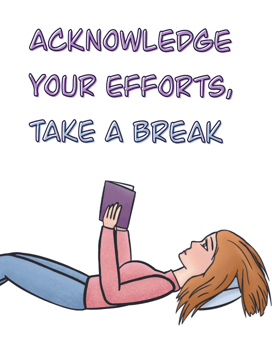How to Stop Overthinking and Cope with Pressure
Written by Ashley Levinna Oei and Eugene Augustine Chang. Cover Image by Kimberly Jasmine Lee
3 min read
Disclaimer!
We are not mental health professionals. This is a general discussion about mental health. It is not to be interpreted as professional advice in a specific situation. Every situation is unique and requires advice to be tailored and adapted to that situation and individual. If you are looking for advice about a specific situation or mental health issues, please speak with a health professional, such as our counselors.
What is Overthinking?
Are you feeling anxious? Worried or nervous? Do not worry, high school students frequently struggle with overthinking. When you find yourself worrying, there is a chance you may be overthinking the situation. Overthinking can take at least two different forms, obsessing over unpleasant memories from the past or an upcoming occurrence that hasn't yet happened. We think that it helps us feel in control of a situation and gain more confidence about our next course of action.
Overthinking is not the same as feeling anxious or disturbed about a certain situation as it usually disrupts you from moving forward at all. You may have developed the habit of overthinking over time by repeatedly going over the same thoughts. It could also indicate that you are simply worn out from having to think through assignments to finish them. Start to take action in your life rather than thinking about the things that are upsetting you by learning how to stop overthinking. Instead of running over the issue in your head, we have some tips for you to try to take the necessary steps to resolve the situation.


Different Types of Overthinking?
Academic pressure and stress typically root from overthinking and/or not meeting certain expectations; whether that be from your peers, teachers, parents, or even from yourself. Academic and non-academic pressure can lead us to overthink. Constant worrying and overthinking often lead to issues with mental health and well-being. So, what does overthinking look like specifically? Of course, everyone may express their anxiousness and stress differently. Because of this, it is important to recognize your feelings, thoughts, and emotions, to prevent further effects. Overthinking can look like dwelling on past events or situations, replaying your mistakes in your mind, second-guessing decisions you’ve made, fixating on things out of your control, or imagining the worst-case scenario or outcome.
Tips on Handling Pressure and Thinking Clearly
The most effective way (but arguably not the easiest way) is to stop waiting for perfection. We all know perfection is impossible to achieve because that is what makes us human. So, don’t be too hard on yourself if you didn’t get the “perfect” grade, get into the “perfect” university, or have the “perfect” life. If you still feel pressure to make something as flawless as possible, know that practice makes progress, not perfect. Learn to be more gentle with yourself.
To cope with stress and pressure, you could take breaks when studying. As IB students, we tend to spend the majority of our time working in front of the laptop, so it can be very beneficial to get time off-screen during study breaks. Stretch your body because chances are your body is tense from sitting in the same position for a long period of time. You could take a short nap or a shower, or tidy up your workspace. If there is more time, you could take a walk outside to breathe in some fresh air, or even just in the house. Do whatever helps you relax for 10 to 20 minutes to help refresh yourself. Remember to stay hydrated and not get hungry too!
There are steps you can take to overthink less and cope with pressure. Techniques such as deep breathing, meditation, self-compassion, and asking for help from a healthcare professional can help alleviate the stress of overthinking. Focusing on mindfulness and noticing when you get stuck in your head can help you rationalize the situation. Journaling your thoughts can also help you alleviate some of the stress. You could write on a book, type on your laptop, or even record voice memos when you have stressful thoughts or frustrations to spill out. Talk about how you feel, what has been bothering you, why it bothers you, what you can or cannot do to help solve the situation, etc. If you can talk to a school counselor or mental health professional, it may be beneficial as you can get professional advice from them. Take care of yourself by rewarding and being gentle with yourself, and acknowledging your efforts.
Illustration by Jessica Florencia




Illustration by Kimberly Jasmine Lee
That concludes our short guide on how to cope with pressure and take care of yourself at tough times. Know that pressure and stress are felt by every student, so you are not alone. But, we understand that it is not an ideal state of mind to feel anxious and worried from pressure, so we hope these tips can help you!


